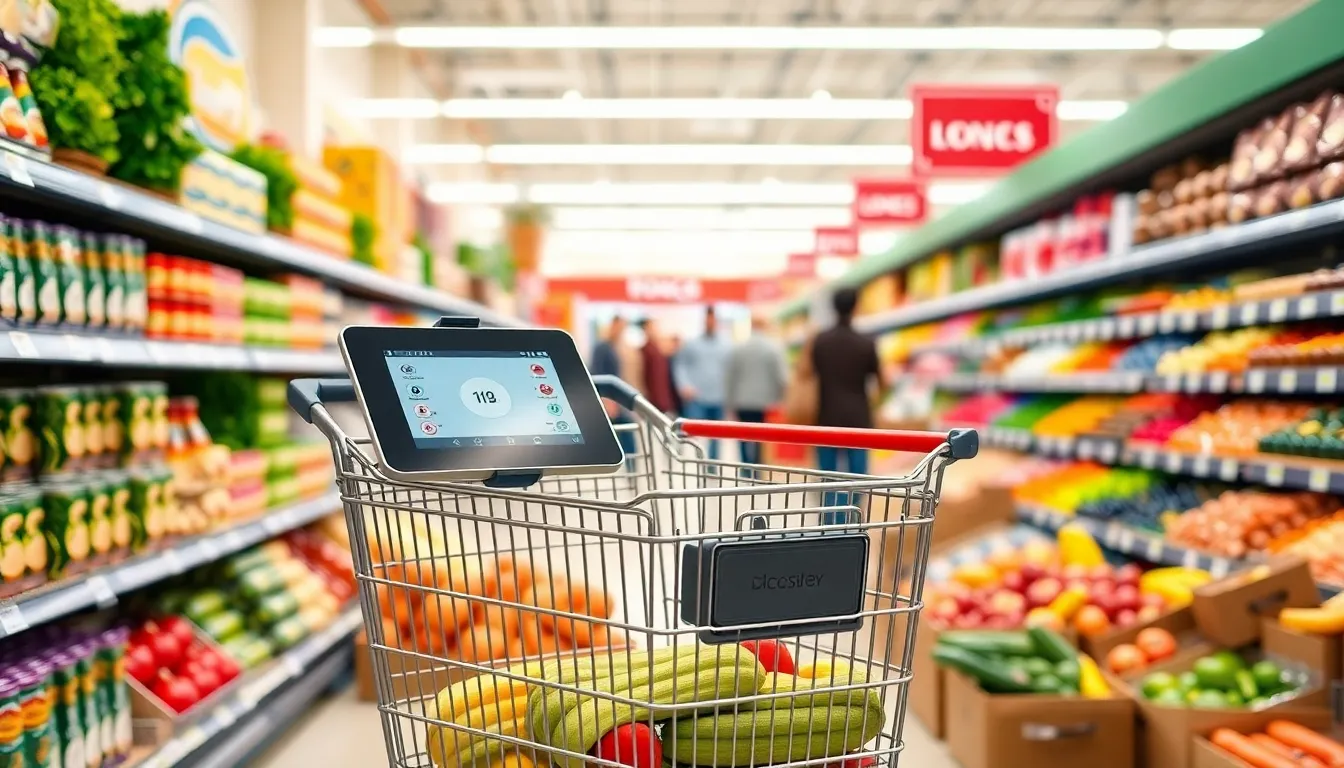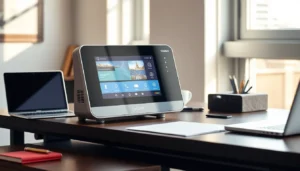Imagine strolling through the aisles of your favorite grocery store, and instead of juggling a shopping list and a cart, you’ve got a smart shopping cart that’s doing the heavy lifting for you. These high-tech carts are like the personal assistants of the retail world, guiding shoppers with real-time inventory, personalized discounts, and even calorie counts. It’s like having a shopping buddy who knows exactly what you need—without the awkward small talk.
Smart shopping carts are revolutionizing the way people shop, making the experience not just easier but also a little more fun. Gone are the days of wandering aimlessly or losing track of the budget. With these carts, every trip becomes a savvy adventure, turning mundane grocery runs into a high-tech treasure hunt. So why not embrace this smart shopping revolution? After all, who wouldn’t want a cart that’s as clever as it is convenient?
Table of Contents
ToggleOverview Of Smart Shopping Carts
Smart shopping carts represent a significant innovation in the retail sector, enhancing the grocery shopping experience through intuitive technology. Equipped with features that simplify shopping, these carts function as personal assistants in stores.
Definition And Purpose
Smart shopping carts are technologically advanced carts designed to assist consumers during their shopping trips. They include built-in screens, barcode scanners, and sensors that create a seamless shopping experience. The primary purpose centers on providing real-time data, allowing shoppers to track their items, manage expenditures, and access personalized promotions.
Benefits For Consumers
Consumers experience several advantages when utilizing smart shopping carts. First, real-time inventory updates keep shoppers informed about product availability, preventing frustration from missing items. Personalized discounts based on shopping habits offer customers greater savings opportunities. Nutritional information and calorie counts help individuals make healthier choices while shopping. Lastly, integrated payment systems streamline checkout processes, reducing wait times and enhancing convenience.
How Smart Shopping Carts Work


Understanding how smart shopping carts operate reveals their potential in revolutionizing shopping experiences. These carts utilize advanced technology to streamline grocery shopping.
Technology Behind Smart Shopping Carts
Smart shopping carts incorporate various technologies, enhancing user experience. Built-in screens display product information, promotions, and estimated total costs. Barcode scanners allow users to quickly add items to their virtual shopping lists. Sensors detect products within the cart, ensuring accurate inventory tracking. Navigation systems assist shoppers in finding items in-store, providing efficient routes based on preferences.
Integration With Retail Systems
Smart shopping carts connect seamlessly with retail systems. Integration with inventory management systems updates product availability in real time. These carts often interface with customer loyalty programs, automatically applying discounts for eligible items. Data analytics tools gather shopping trends, enabling more personalized marketing strategies. Retailers benefit from enhanced customer insights, improving overall store performance.
Advantages For Retailers
Smart shopping carts offer significant benefits for retailers, enhancing both operations and customer interactions. These innovative tools create engaging experiences while improving efficiency.
Enhancing Customer Experience
Retailers leverage smart shopping carts to elevate customer engagement. Shoppers appreciate real-time product information displayed on the carts’ screens, making it easier to find items. Retailers benefit from customer satisfaction, leading to increased loyalty. Personalized discounts encourage shoppers to purchase more, impacting overall sales positively. Faster checkout processes reduce long lines, contributing to a seamless shopping experience. Ultimately, smart carts transform customer interactions into enjoyable and efficient trips.
Inventory Management Solutions
Smart shopping carts streamline inventory management for retailers. Real-time tracking of product availability helps ensure stock levels meet customer demand. Retailers can identify trends and adjust inventory accordingly, preventing overstock or stockouts. Data gathered through smart carts enables detailed analytics, allowing retailers to make informed decisions. Automated inventory updates improve accuracy, enhancing operational efficiency. This proactive approach to inventory management fosters improved financial performance and operational effectiveness.
Challenges And Limitations
Despite their benefits, smart shopping carts face significant challenges and limitations that hinder widespread implementation.
Cost Implications
Costs associated with smart shopping carts can pose obstacles for retailers. Initial investments in technology and infrastructure require substantial financial resources. Maintenance expenses add to the overall cost, as systems must remain updated to function efficiently. Retailers must also consider potential training costs for staff to ensure smooth operation. While many expect that long-term savings will outweigh these expenses, hesitation over upfront investments remains a challenge in adoption.
Consumer Adoption Issues
Consumer acceptance presents another hurdle for smart shopping carts. Familiarity with traditional carts contributes to resistance against new technology. Users may express concerns about data privacy, fearing unauthorized access to personal information. Additionally, some shoppers might find the technology intimidating or complicated to use, deterring them from taking full advantage of smart features. Retailers must address these barriers through education and transparent communication to foster consumer trust and confidence in smart shopping carts.
Future Trends In Smart Shopping Carts
Smart shopping carts are poised for significant evolution. Innovations in technology promise enhancements that make shopping even more efficient.
Innovations On The Horizon
Next-generation smart shopping carts will feature augmented reality (AR) capabilities, providing interactive shopping experiences. Such features could guide users through stores, displaying product locations and special deals in real time. Additionally, integration with mobile apps will create personalized shopping lists, simplifying the overall process. Advanced data analytics will allow these carts to learn individual preferences, offering tailored recommendations. Furthermore, improved battery life and wireless charging options are expected to enhance convenience during extended shopping trips.
Impact On The Retail Industry
Smart shopping carts are set to redefine customer engagement in retail. Shoppers increasingly prefer personalized interactions, leading to greater satisfaction and loyalty. Retailers can expect increased sales through real-time promotional offerings that encourage impulse purchases. Furthermore, streamlined checkout processes will significantly reduce wait times, enhancing the overall shopping experience. Efficient inventory management will arise from accurate product tracking, allowing retailers to respond to demand quickly. Adoption of these innovative carts can enhance retailers’ operational efficiency while providing valuable customer insights to refine marketing strategies.





